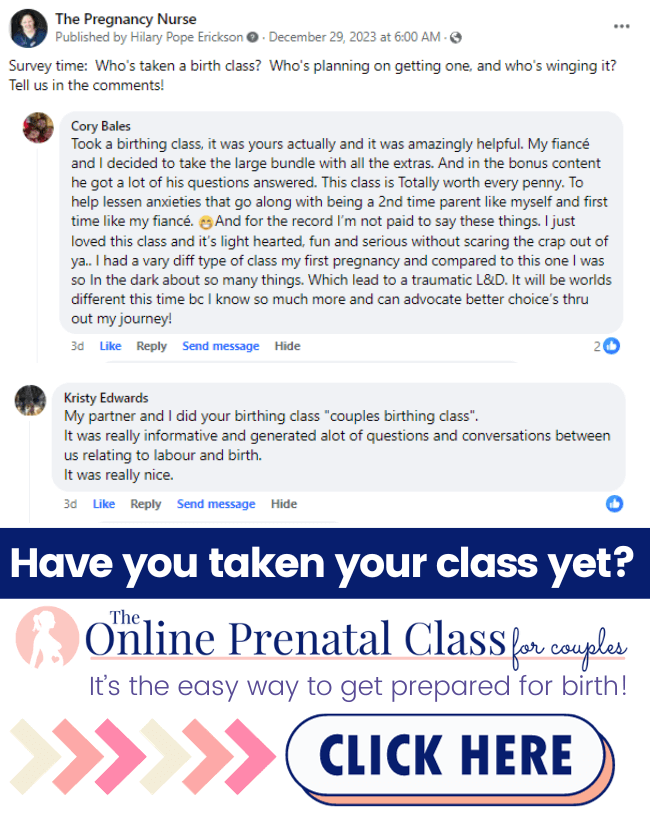👋 I’m so glad YOU are here. Are you looking to also get your partner prepared? This is for BOTH of you. Couples just love it and I know you want to both feel prepared!
During your third trimester of pregnancy, you may experience a pulled stomach muscle (or a pulled ligament). This is a common occurrence and is caused by the added weight and pressure of the fetus on your muscles and ligaments. While it is not usually serious, it can be debilitating and uncomfortable. There are ways to ease the pain and make sure that you stay healthy and comfortable during this time.
But first, how do I know all of this? Hi — I’m Hilary — The Pregnancy Nurse 👩⚕️. I have been a nurse since 1997 and I have 20 years of OB nursing experience, I am also the curly head behind Pulling Curls and The Online Prenatal Class for Couples. 🩺 I have had so many moms come in with extreme pain (thinking either they were in labor or something was wrong) that ended up being this, so I am good to chat with you about what you can do.
And, if your stomach is extra gurgly during pregnancy… I have a post on that too. 🙂
What is a pulled stomach muscle during pregnancy and what are the symptoms
While you CAN pull a muscle, most often this is actually pulling on one of the ligaments that holds your uterus in place.
Think of your uterus as a pillow, and these ligaments stretch to the corners of that pillow to keep it tied to your body.
As your uterus grows those ligaments get STRETCHED, like a tight rubber band, so when you add extra stress by coughing, standing, getting out of a car — they tend to get ANGRY, and can cause a LOT of pain. I have a whole post on sharp abdominal pains you might find helpful.
The symptoms include pain in the abdominal area, often on one side or both sides, and can range from mild to severe. The way that women describe this pain is:
- Burning
- A tearing sensation initially followed by throbbing or stabbing pains
It is important to note that this pain is different from Braxton Hicks contractions, which are also common in the third trimester. If you are experiencing abdominal pain, it is important to consult with your healthcare provider to rule out any other potential causes.
Pro tip: Contractions tend to last 30 seconds to a minute and then go away, often with a tightening of your belly. If the pain is constant, it is likely not a contraction (and is often ligament pain).
It is important to note that these types of pains are NORMAL, but that doesn’t make them any less painful — so stay tuned so we can chat about what you can do!
Knowing what’s normal is SO important — it can really put your mind at rest (since everything seems so AB-normal, am I right). The Online Prenatal Class for Couples does just that for you!
Causes of a pulled stomach muscle during pregnancy
Honestly, just the growing of your uterus is the biggest contributor to this — but there are a lot of (normal) things that we do that can add to it.
- Using poor body mechanics when standing
- Coughing
- Over-doing it physically (reaching, stretching etc).
Looking to get prepare for your birth? I have some easy options for you!
~~~~~~~~
– Worried you’re missing something? Grab my pregnancy planner so you don’t miss a thing!
– Thinking about an induction? Grab Inductions Made Easy to feel prepared in just 20 minutes!
– Wondering how to get that baby OUT? Grab Going Into Labor Made Easy so you know how to (and not to) do it!
– Postpartum got you anxious? Check out Postpartum Care Made Easy so you can stay SAFE even when all your attention is on that little on.
🚨 AND if ALL OF IT has got you on edge The Online Prenatal Class for Couples is perfect for you — You’ll feel so ready before you even know it!
~~~~~~~~
No matter WHERE you are at in your pregnancy journey, we have resources that can help!
How to treat a pulled stomach muscle during pregnancy
There are several ways to treat a pulled stomach muscle during pregnancy.
First, it is important to try to rest and avoid any activities that may aggravate the pain. Ice and heat can also be helpful in managing the pain.
Over-the-counter pain medications, such as acetaminophen or ibuprofen, can also be taken soemetimes — but talk with your healthcare provider if they’re OK for you.
If the pain is severe, your healthcare provider may prescribe a stronger medication. Physical therapy may also be recommended.
You could also consider visiting a chiropractor!
Pro Tip: I know a lot of doctors may NOT want you to see a chiropractor because SOME really have weird recommendations during pregnancy. Make sure to see one that is trained in the Webster technique and they should really be able to help your hips and pelvis feel better (I had one on my podcast and she really helped my understand it better). Chiropractors, when used right can be VERY helpful!
Prevention tips for avoiding a pulled stomach muscle during pregnancy
There are several things that you can do to help prevent a pulled stomach muscle during pregnancy.
First, it is important to maintain good posture and alignment. This means standing up straight and avoiding any activities that require you to strain your muscles, such as lifting heavy objects. When you do need to do activities that have aggravated it in the past (or could bother it) make sure you’re using good body mechanics (this is where a physical therapist can come in to help a LOT).
Second, you should wear supportive clothing and shoes. This will help to take some of the pressure off of your muscles and ligaments. Perhaps wearing some belly straps might help.
Finally, it is important to stay hydrated and eat a well-balanced diet. This will help to keep your muscles and ligaments healthy and prevent them from becoming strained.
When should you see a doctor if you experience a pulled stomach muscle during pregnancy
Honestly, I would recommend telling your doctor soon if you’re experiencing abdominal pain. You’d want to make sure that everything is OK and you are not possibly experiencing preterm labor.
If you experience severe pain or if the pain is not alleviated with home treatments, it is important to consult with your healthcare provider. They will be able to rule out any other potential causes of the pain and provide you with further treatment recommendations.
Pro Tip: It’s super important to bring up any issues you’re experiencing at your prenatal appointment. Perhaps you just want to know if it’s normal, and perhaps you want help to fix it — be clear with your provider about what you are wondering so they can best help you.
Of course, taking a course that can help you know what IS normal and what is NOT can be really nice too. The Online Prenatal Class for Couples will share exactly what to expect as you head into your delivery.
- It can be done in just a few hours
- Starts at just $35
- Taught by a highly experienced nurse who knows what YOU need to know.
Save 10% with coupon code PREGNURSE today!
And, if you’re not quite sure you’re ready for that whole thing, check out my free prenatal class. It’s your first step toward getting in the driver’s seat of your birth.





 When Does a Baby Turn Head Down During Pregnancy?
When Does a Baby Turn Head Down During Pregnancy?
